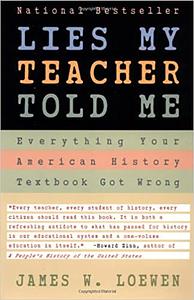You need to sign in or sign up before continuing.
Take a photo of a barcode or cover
1.01k reviews for:
Lies My Teacher Told Me: Everything Your American History Textbook Got Wrong
James W. Loewen
1.01k reviews for:
Lies My Teacher Told Me: Everything Your American History Textbook Got Wrong
James W. Loewen
informative
reflective
medium-paced
3.75 stars
It took me a very long time to get through this. But it also made me question how high school history even made me get interested in history in the first place. Primary history education in the US (not sure about other countries) is like rote memorization of key events, figures, and dates with little to no call for analysis. It’s also super negligent to minority groups, which this book touches on frequently.
I think the author illustrated his point very thoroughly. History textbooks could be improved upon greatly, and I remember learning history the way that he describes it in this book. I’d love to see a 2023 version of this just to see what would change or be added.
I’d recommend this to fans of history, historiography in particular, but also to anyone who feels like their understanding of history and how it was taught to them may have been lacking. Which I would assume to be the general population.
It took me a very long time to get through this. But it also made me question how high school history even made me get interested in history in the first place. Primary history education in the US (not sure about other countries) is like rote memorization of key events, figures, and dates with little to no call for analysis. It’s also super negligent to minority groups, which this book touches on frequently.
I think the author illustrated his point very thoroughly. History textbooks could be improved upon greatly, and I remember learning history the way that he describes it in this book. I’d love to see a 2023 version of this just to see what would change or be added.
I’d recommend this to fans of history, historiography in particular, but also to anyone who feels like their understanding of history and how it was taught to them may have been lacking. Which I would assume to be the general population.
challenging
informative
slow-paced
challenging
informative
reflective
tense
medium-paced
challenging
informative
reflective
slow-paced
informative
inspiring
reflective
medium-paced
How accurate are American textbooks? This book highlights that they are not very accurate, which could be why many students don't see the importance of history. It's also the reason adults often fail to see how the past connects with the future. The author examines various historical facts and compares how they are presented, as well as what could be taught differently. One thing is clear from this book: history could be the foundation of teaching kids critical thinking.
What do you really know about history? This book made me confront what I actually learned in school. Today, our public school system appears to focus on preparing students for an end-of-year test rather than teaching them how to critically examine a subject. My main takeaway is that American history classes are often used to disseminate propaganda in this country. The watered-down history we receive leaves us bored and unable to envision a better future because we cannot critically examine the past. I believe if we taught kids how to think critically in history, it would also help them think critically in English classes. We cannot complain that kids can't or don't read and then provide no help to develop them into critical thinkers.
I would recommend this book to those who enjoy questioning mainstream narratives and are seeking a critical, thought-provoking exploration of American history. It offered a wealth of interesting facts, but it also provided me with insight into how I can continue to improve as a lifelong learner. Some of the questions will be helpful in my historical readings.
What do you really know about history? This book made me confront what I actually learned in school. Today, our public school system appears to focus on preparing students for an end-of-year test rather than teaching them how to critically examine a subject. My main takeaway is that American history classes are often used to disseminate propaganda in this country. The watered-down history we receive leaves us bored and unable to envision a better future because we cannot critically examine the past. I believe if we taught kids how to think critically in history, it would also help them think critically in English classes. We cannot complain that kids can't or don't read and then provide no help to develop them into critical thinkers.
I would recommend this book to those who enjoy questioning mainstream narratives and are seeking a critical, thought-provoking exploration of American history. It offered a wealth of interesting facts, but it also provided me with insight into how I can continue to improve as a lifelong learner. Some of the questions will be helpful in my historical readings.
funny
informative
reflective
slow-paced
challenging
informative
fast-paced
Although the premise of this book is awesome, the first two chapters are way too long and started losing my interest. Loewen goes into WAY too much detail and too much back story and lost a lot of gusto. I found myself skimming through the rest of the chapters. He's obviously a liberal person and I found his own politics overshadowing the facts.
As a history teachers wife, I know a thing or two about teaching. There is no way any teacher can teach anything completely unbiased. Whatever the teacher's passions are come out in his/her lesson plans.
As a history teachers wife, I know a thing or two about teaching. There is no way any teacher can teach anything completely unbiased. Whatever the teacher's passions are come out in his/her lesson plans.
informative
reflective
medium-paced


